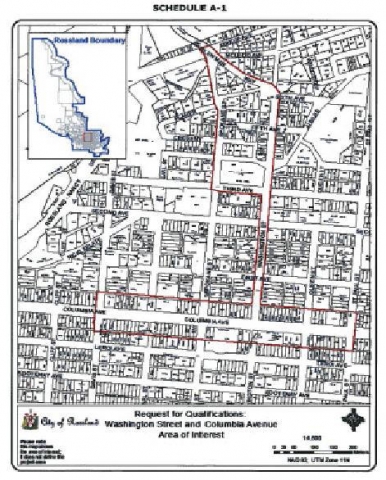Engineering to begin on Columbia/ Washington streets and sewer project
The city now has approval in hand to proceed with at least the first stage – an engineering assessment – of the Columbia Avenue/ Washington streets and sewer project.
Council voted Monday night to authorize administrator Victor Kumar to spend up to $250,000 on an official engineering assessment of the state of the “sub-surface infrastructure” in the city’s downtown core (see map). The last status report was completed in 2008 through review of maintenence crew reports and an above-ground walkabout, and is not detailed enough to assess the actual engineering cost of the sewer upgrade/replacement project or, indeed and officially, whether that project should proceed.
Though it’s looking awfully likely.
A scant 19 citizens formally objected to the city’s proposal to borrow up to $6 million for the project, not nearly the 10 per cent of the community that would have had to petition against allowing the borrowing through the Alternative Approval Process, which closed on February 10.
That means the city just voted in what administrator Victor Kumar carefully called a “credit facility of $6 million.” Though in order to actually borrow, he said, council will have to approve another bylaw to cover the issuing of securities (bonds) with a 20 year life or less, or a “temporary borrowing” bylaw if the costs come in at a price point manageable within the five year limit of that designation.
Clear as mud? Some councillors weren’t convinced.
Councillor Hanne Smith expressed some concern that the city information posted regarding the AAP process was less than clear, and perhaps confusing for some citizens. Councillor Andy Stradling was troubled by the structure of the AAP process, drawing a comparison with “opt-out marketing,” where a company offers (and charges for) some benefit, leaving it up to individual consumers to advise they’d rather do without it – a no-no under consumer protection laws.
Stradling warned council “not to make assumptions about the level of support for the process. . . it’s difficult to judge the ‘don’t knows’ and ‘don’t cares’ from the approvers.”
“I think some of the concerns that have been raised are significant,”he continued. “We should be very judicious in the use of the public’s money and not assume that we have 51 per cent of the public’s approval for this project or for borrowing $6 million dollars.”
To get that 51 per cent, the city would have to hold a referendum, an option staff briefing documents indicate would be nonsensical without a reasonable financial estimate to present. That estimate can come only from completing phase one of the engineering, an in-depth and underground assessment of the current state of the system and the costs to proceed with its repair or replacement, should that prove necessary.
“I am not one to say that we don’t need the engineering,” said Stradling, who holds a Phd in minerals engineering and a prestigious research position at Teck. “But this is detailed design.”
Stradling’s process concerns center around a lack of clarity in the documents presented to council Monday about just how much power over the project is being handed over to the administrator. For instance, the Request for Qualifications attached to the council package appeared as a sort of appendix to the decision to allow Kumar to spend up to $250,000 in phase one assessment engineering. The structure of the presentation did not allow for a separate vote on the langage of the RFQ itself, and detailed discussion of that document was emphatically discouraged by the mayor.
But the RFQ leads with an invitation for qualified engineering firms to “submit qualifications for project-specific services for all necessary re-design, replacement and necessary upgrades for the revitalization of its Columbia Avenue and Washington St. Corridors infrastructure,” leading any reasonable reader to assume this is the RFQ to find a firm for the entire project – rather than for the initial assessment only, as is indicated on the attached briefing document and approved upon the successful vote authorizing the $250,000 for the initial assessment. Later in the RFQ, the request is laid out more clearly, with a note that:
“Upon completion of this first design and costing phase to the City’s satisfaction, the successful proponent may be further contracted to lead, manage, contract and supervise the proposed 2012 construction project…” Emphasis added.
There is no cause for confusion, and council will remain fully in charge of the project and how/if it proceeds, Kumar indicated.
“I don’t issue any contracts. The tender goes out, (it) comes back to council.”
“There’s not a staff member that can approve $6 million dollars,” said Mayor Greg Granstrom. “Staff can’t make that decision at all.”
Once the initial engineering assessment is in, “Council will have a say in what goes from there, is that correct?” he questioned Kumar.
“Exactly,” was the administrator’s response.

























